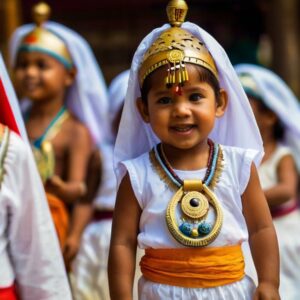The Festival of Lights
The Festival of Lights, Diwali, represents a hallmark of cultural and spiritual significance primarily in India and extends its reach throughout various South Asian communities. This luminous celebration is an embodiment of the eternal and hopeful narrative of light prevailing over darkness and virtue overpowering malice. Spanning over five days, each with its unique significance and a diverse array of celebratory practices, Diwali offers families and communities the chance to dive deep into the heart of cultural richness and heritage. The festival is characterized by an eye-catching display of fireworks that light up the night sky, symbolizing the joy and victory associated with the occasion. Homes become canvases for vibrant rangoli designs, intricately laid out on the ground using an array of materials such as colored powders, rice, and petals, adding to the visual feast that Diwali is known for. These colorful patterns are believed to welcome guests and divine entities, ensuring blessings upon the household. The traditional lighting of diyas, small oil lamps made of clay reinforces the festival’s core theme by illuminating homes and communities, driving away the shadows of evil and ignorance. Beyond the aesthetic allure, Diwali is a time for family reunions, where loved ones gather, exchange gifts, and participate in various traditional activities that further bond them in their shared heritage and joy. The culinary aspect of the festival is equally significant, with an array of mouthwatering sweets and sumptuous dishes that are unique to this celebration, offering a taste of the region’s rich gastronomic diversity. Participating in Diwali, be it within the familial setting or as part of a larger community gathering, is an immersive experience. It provides an invaluable opportunity to learn firsthand about Hindu culture, delve into the epic saga of Lord Rama and his triumphant return to Ayodhya after defeating the demon king Ravana, and understand the profound significance of light as a symbol of hope, guiding humanity to overcome the darkness of ignorance and evil.
Brazil’s Exuberant Celebration

Brazil’s Carnaval is a captivating demonstration of the country’s resilient spirit and cultural dynamism, presenting an unmatched spectacle of rhythm, color, and collective effervescence. Held annually in the week leading up to Lent, this vibrant celebration acts as a cultural melting pot, reflecting the rich tapestry of Brazil’s diverse heritage through its spectacular parades and festive activities, particularly in iconic cities like Rio de Janeiro and Salvador. The heart of Carnaval is undoubtedly its grandiose parades, where each samba school competes in dance and music and storytelling, with elaborately themed costumes and floats that breathe life into historical narratives, folklore, and contemporary issues alike. These processions are a feast for the senses, showcasing the unparalleled artistry and craftsmanship of the Brazilian people.
Beyond the official parades, the streets of Brazil transform into a boundless playground of joy and freedom. “Blocos,” or street parties, erupt in every corner, inviting families and attendees from all walks of life to join in the spontaneous dance and music celebrations. These blocos serve as the lifeblood of Carnaval’s street festivities, offering a more accessible yet equally exhilarating experience, where the barriers between performers and spectators blur, and everyone is united in revelry.
Participating in Carnaval offers families а chance to witness the extravaganza of performances and parades but to immerse themselves in the essence of Brazilian culture. It’s an opportunity to understand the deep-rooted significance of this festival, which transcends entertainment to become a symbol of national identity, social cohesion, and a testament to the enduring spirit of the Brazilian people. Families joining in the festivities can learn about the intricacies of samba, the historical significance of the costumes and dances, and the importance of Carnaval as a form of cultural expression and resistance. It’s a celebration where the pulsating rhythms of the drumbeats, the mesmerizing sway of the dancers, and the kaleidoscopic burst of colors create a spellbinding experience that captures the exuberant soul of Brazil, making Carnaval an indelible memory for anyone who partakes in its joyous abandon.
Chinese New Year
Chinese New Year, also known as the Spring Festival, marks the beginning of the lunar new year and is the most important traditional festival in Chinese culture. Celebrations span two weeks, culminating in the Lantern Festival. It’s a period filled with family reunions, special meals, fireworks, and red decorations symbolizing good luck and happiness. Participating in Chinese New Year activities offers families a deeply educational experience, including learning about the Chinese zodiac, traditional lion and dragon dances, and the making of dumplings and nian gao (a sweet rice cake). Cities worldwide with significant Chinese communities host parades, cultural performances, and food markets, making it accessible for families to explore these traditions.
Oktoberfest
Oktoberfest in Munich, Germany, is recognized as the world’s largest Volksfest (folk festival), combining a massive beer festival and a traveling funfair. While beer might be a central element, Oktoberfest is also family-friendly, featuring amusement rides, side stalls, games, and traditional Bavarian music and dances. Families can enjoy the historical costumes, taste various Bavarian foods like pretzels, sausages, and roast chicken, and partake in the festival’s wholesome entertainments. The event includes a parade showcasing cultural costumes, riflemen’s processions, and horse races. Oktoberfest’s origins and its celebration of Bavarian culture and fellowship provide a unique learning opportunity while having fun.
Ramadan and Eid al-Fitr
Ramadan, the Islamic month of fasting, and Eid al-Fitr, the festival marking its conclusion, offer profound insights into Islamic traditions and values. During Ramadan, families can experience the importance of reflection, community, and hospitality, with nightly iftars (breaking of the fast) and gatherings. Eid al-Fitr starts with a special prayer and is followed by festivities including feasting, giving charity (zakat al-fitr), and sharing gifts. Engaging with these observations allows families to learn about the principles of Islam, the significance of fasting, the lunar calendar, and the spirit of generosity that characterizes this period. Participating in or attending Eid celebrations in your community can be a rewarding cultural and educational experience.